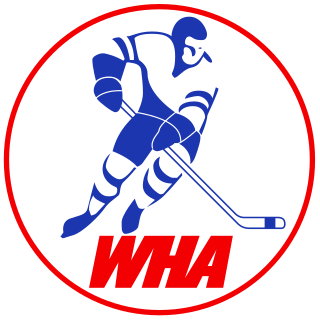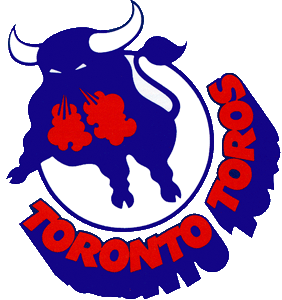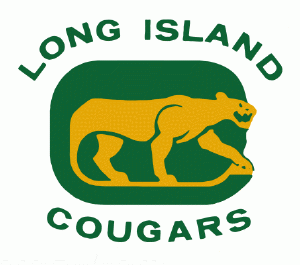
The World Hockey Association was a professional ice hockey major league that operated in North America from 1972 to 1979. It was the first major league to compete with the National Hockey League (NHL) since the collapse of the Western Hockey League in 1926. Although the WHA was not the first league since that time to attempt to challenge the NHL's supremacy, it was by far the most successful in the modern era.
George Robert Ramage is a Canadian former professional ice hockey defenceman who played 15 seasons in the National Hockey League (NHL) for the Colorado Rockies, St. Louis Blues, Calgary Flames, Toronto Maple Leafs, Minnesota North Stars, Tampa Bay Lightning, Montreal Canadiens and Philadelphia Flyers. He also played one season in the World Hockey Association (WHA) for the Birmingham Bulls. He was a two-time Stanley Cup winner in the NHL.

Richard Claude Vaive is a Canadian former professional ice hockey player. He played in the final season of the World Hockey Association (WHA) and played in the National Hockey League (NHL) from 1979 to 1992. While with the Toronto Maple Leafs, he became the first member of that team to score 50 goals in a season.

David James "Tiger" Williams is a Canadian former professional ice hockey player who played in the National Hockey League (NHL) from 1974 to 1988. He played in the 1981 NHL All-Star Game and the 1982 Stanley Cup Finals. He is the NHL's career leader in penalty minutes. He was nicknamed "Tiger" as a 5-year-old by his minor hockey coach in Weyburn, Saskatchewan.

The Indianapolis Racers were a major league ice hockey team that played in the World Hockey Association (WHA) from 1974 to 1978. They competed in four full seasons before folding 25 games into the 1978–79 season. They played at Market Square Arena. They were the first professional team to secure Wayne Gretzky and Mark Messier.
John Duncan Brophy was a Canadian ice hockey coach and hockey player who spent most of his career in minor professional leagues, including 18 years as a player in the Eastern Hockey League and 13 seasons as a coach in the East Coast Hockey League. From 1986 to 1988 the native of Antigonish was head coach of the Toronto Maple Leafs of the National Hockey League.

The Toronto Toros were an ice hockey team based in Toronto that played in the World Hockey Association from 1973 to 1976.

Michel Bernard Goulet is a Canadian former professional ice hockey forward who played for the Birmingham Bulls in the World Hockey Association and the Quebec Nordiques and Chicago Blackhawks in the National Hockey League. He was also a two-time Canada Cup champion with Team Canada. He was inducted into the Hockey Hall of Fame in 1998.
The 1979–80 NHL season was the 63rd season of the National Hockey League. This season saw the addition of four teams from the disbanded World Hockey Association as expansion franchises. The Edmonton Oilers, Winnipeg Jets, New England Whalers, and Quebec Nordiques joined the NHL, bringing the total to 21 teams. The other two WHA teams were paid to fold.
The 1978–79 WHA season was the seventh and final season of the World Hockey Association (WHA). Prior to the start of the season, the Houston Aeros folded leaving seven teams to start the season. Only six would finish however, as the Indianapolis Racers folded after 25 games on December 15, 1978. The remaining six teams each played 80 games, including one game each per team against a Soviet All-Star squad and the Czechoslovak National Team, the second consecutive year for this arrangement. The Soviet team won four of their six games and tied another; the Czechoslovak team only won once and tied once against four losses. In addition, because the Racers had folded after playing an odd number of games, the Edmonton Oilers played the Finnish National Team once at home so as to allow each of the six surviving WHA teams to play 80 regular season games. The Oilers won by a score of 8–4, a result which in itself made no difference by the end of the regular season which Edmonton won by an 11–point margin over the Quebec Nordiques.
Blair Neil Joseph "B. J." MacDonald is a Canadian former professional ice hockey player who played in the National Hockey League and World Hockey Association between 1973 and 1983. He featured in the 1979 WHA Final with the Edmonton Oilers and the 1982 Stanley Cup Finals with the Vancouver Canucks.

Gaston Reginald Yoland Gingras is a Canadian former professional ice hockey defenceman who played one season in the World Hockey Association (WHA) and ten seasons in the National Hockey League from 1978 to 1989. He won the 1986 Stanley Cup with the Montreal Canadiens.
Glen Robert Sonmor was a Canadian professional ice hockey player, scout and coach. He played 28 games in the National Hockey League with the New York Rangers from 1953 to 1955, though most of his career was spent in the minor American Hockey League. After his playing career, Sonmor turned to coaching. He led the University of Minnesota from 1966 to 1972, then went to the World Hockey Association, where he was the general manager, and occasional coach, of the Minnesota Fighting Saints and Birmingham Bulls between 1972 and 1978. He then moved to the NHL to coach the Minnesota North Stars from 1978 to 1987. Later in his career, Sonmor became a scout for the Minnesota Wild of the NHL.
The 1979 NHL expansion draft was held on June 13, 1979. The draft took place to fill the rosters of the National Hockey League's new teams for the 1979–80 season: the Edmonton Oilers, Hartford Whalers, Quebec Nordiques and Winnipeg Jets. These four teams had joined the NHL after a merger agreement was reached with the World Hockey Association (WHA).
The 1978–79 OMJHL season was the fifth season of the Ontario Major Junior Hockey League (OMJHL). The Hamilton Fincups moved to Brantford, Ontario, becoming the Alexanders. Twelve teams each played 68 games. The Peterborough Petes won the J. Ross Robertson Cup, defeating the Niagara Falls Flyers.

The Jersey Devils were an American professional ice hockey team based in Cherry Hill, New Jersey.
The 1979–80 Quebec Nordiques season was the Nordiques eighth season overall, however, it marked as their expansion season in the National Hockey League. Quebec had played their previous seven seasons in the now defunct World Hockey Association. In 1978–79, their last season in the WHA, Quebec finished the year with the second best record, as they had a 41–34–5 record, earning 87 points. The Nordiques were then swept by the Winnipeg Jets in the WHA semi-finals. In the NHL, the team finished out of the playoffs.

The Long Island Cougars were a minor league professional ice hockey team that played at the Long Island Arena in Commack, New York, from 1973 to 1975. The Cougars were a member of the North American Hockey League, and were runners up for the Lockhart Trophy to the Syracuse Blazers in the 1973–74 season.









